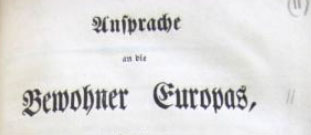European political cultures of anti-slavery
The European political cultures of anti-slavery database gives an insight into debates surrounding the abolition of the slave trade and slavery in Europe. It examines how anti-slavery politics contributed to the construction of European national identities in the nineteenth century. A political culture can be defined as a set of attitudes, beliefs and values determined by society and relating to a particular political issue, or to politics in general.
This database focuses on making useful connections and comparisons between anti-slavery political cultures in different European countries. It spans the period from the founding of the first European abolitionist society in London in 1787, to the major European anti-slavery conference held in Brussels in 1889. This period of just over a century saw the development of abolitionism into a major political force, capable of changing national policies and influencing the ways that Europeans viewed themselves.
There are three main strands within the database:
There are also three essays linked to the project, which explain in more detail the importance of each of these three strands within European political cultures of anti-slavery. The database enables the user to compare sources, examining how they functioned during the nineteenth century in different European contexts. A wealth of material has already been made available regarding the abolition of slavery via initiatives such as 'Recovered Histories' (the online archives of Anti-Slavery International). This database does not compare in size with the scope of these resources – a collection of all abolitionist campaign materials across Europe for the entire nineteenth century could have included thousands of items. Instead, it takes a selective, comparative approach. A short summary of each text is offered, highlighting particularly relevant themes such as national identities and international relationships. These highlighted aspects are then linked together and set within a broader political context through the three essays. A number of downloads are available via the website. These include the three essays, as well as a series of database highlights, which provide images and more information, in order to give a more detailed picture of the political cultures of anti-slavery in nineteenth-century Europe. Abolition campaign materialsThe first strand, dedicated to European abolitionist campaigns, forms the largest part of the database. The idea of 'campaign materials' is interpreted broadly, to include political pamphlets, essays, books, newspaper articles, poems, petitions, letters, diary extracts, minutes from campaign meetings and diagrams. A considerable amount of this material was translated and sent between different countries in Europe, appearing in multiple languages including Danish, French, German, Italian, Russian, Swedish, English, Portuguese, Dutch and Spanish. Translations published during this period are included in the database, in order to build up a picture of how campaign materials and abolitionist ideas were circulating in Europe during the nineteenth century.
Abolitionist politics and national identities in nineteenth-century Europe Travel narrativesThis section of the database includes first person accounts of the slave trade and slavery written in the eighteenth and nineteenth centuries. These travel narratives were produced by naval captains, sailors, missionaries, former slaves and paid workers in the plantations of the Caribbean, scientists, abolitionists and others who had travelled within Africa, the Americas or the Indian Ocean between the 1780s and the 1880s. Travel narratives were among the most influential and widely-read accounts of slavery available to the general public at the time. The accompanying essay shows how they contributed to the growth of European political cultures of anti-slavery.
Slave trades, slavery and emancipation in nineteenth-century European travel narratives Legislation and constitutionsThe final category includes European treaties, legislation and constitutions which were created in the nineteenth century, and approached the issue of slavery and slave trading from a legal perspective. It also includes abolitionist pamphlets that dealt with the legalities of abolishing slavery and the slave trade or proposed new laws and new penalties for slave traders. These legislative texts played an important role in changing attitudes towards slave trading and slavery in Europe.
European anti-slavery legislation, international treaties and constitutional change Sources for material:Thanks are due to the following museums, libraries and archives that generously gave permission for the use of their materials and help: the Library of the Religious Society of Friends in Britain, Tyne and Wear Archives, Newcastle Libraries, Wilberforce House in Hull, the Wisbech and Fenland Museum, the National Maritime Museum in Greenwich, London, the library of the Société de l'histoire du Protestantisme français in Paris, the Archives départementales de la Somme in Amiens and Archives départementales de la Gironde in Bordeaux, the Goldsmiths' Library at Senate House, University of London, Rhodes House Library in Oxford, St John's College, Cambridge as well as the French national archives, and national libraries of Britain, France and Spain. Thanks also to the École des Hautes Études en Sciences Sociales in Paris. The source of manuscripts and printed materials is indicated in the database, and the latter are often available from multiple locations. Links are provided to material which has been made digitally available online for free, largely via three repositories: the Gallica digital library of the Bibliothèque Nationale de France (www.gallica.bnf.fr), Internet Archive (www.archive.org) and the Recovered Histories collection (www.recoveredhistories.org). Users of the database with university library subscriptions will be able to access more material via online databases, including the collections of the Library of the Religious Society of Friends in Britain and the Goldsmiths' Library of Economic Literature, University of London. |









